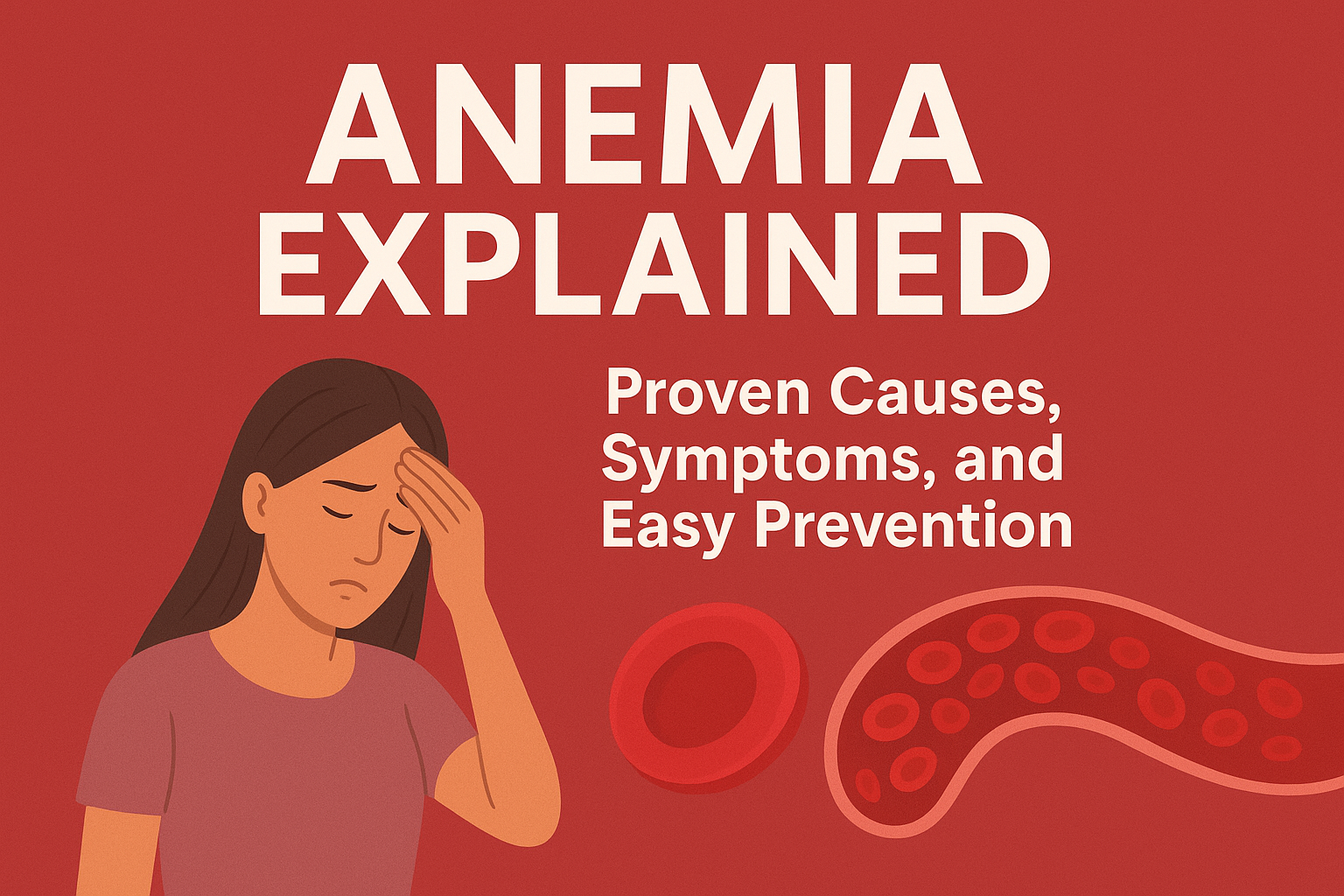Anaemia is one of the most common health problems in the world, yet most people don’t know they have it until it starts to affect their daily lives. This quiet disease happens when your body doesn’t have enough healthy red blood cells to carry oxygen to your tissues. What happened? Tiredness, weakness, dizziness, and a general sense of low energy can make it hard to do anything. Anyone can get anemia, but it is more common in women, children, and elderly persons.
To stay healthy and active, you need to know what anemia is, what causes it, what the symptoms are, and how to avoid it. Let’s look at how this illness happens, why it’s more prevalent than you believe, and what you can do to stop it from happening.
What is anemia, and what does it do to the body?
When there aren’t enough red blood cells or hemoglobin, the protein in red blood cells that carries oxygen, you have anaemia. Your body can’t work right if it doesn’t get adequate oxygen. This shortage of oxygen makes you feel fatigued, weak, and unable to focus.
Untreated, even slight anemia can lead to health problems that last a long time. In serious circumstances, it can hurt your heart health, your immune system, and your general physical performance.
What Causes Anaemia Most Often
Iron deficiency anemia is the most frequent type of anemia; however, there are other varieties as well. These are the key reasons:
Not enough iron:
The body needs iron to generate hemoglobin. Anemia can happen when there isn’t enough iron in the body. This might happen because of a bad diet, blood loss, or pregnancy.
Vitamin Deficiency:
Not getting enough vitamin B12 or folic acid can stop your body from making enough red blood cells.
Chronic illnesses:
Chronic illnesses like cancer, renal disease, and autoimmune disorders can change how many red blood cells your body makes.
Blood Loss:
Heavy periods, bleeding inside the body, or an injury can all lead to anemia.
Genetic Disorders: Sickle cell anemia and thalassemia are examples of genetic conditions that change the form and function of red blood cells. Signs of anemia can be slight or severe, and they usually get worse over time.
The most prevalent anemia signs are:
- Always tired and low in energy
- Skin that is pale or yellow
- Breathlessness
- Feeling dizzy or light-headed
- Hands and feet that are cold
- Heartbeats that aren’t regular
- Headaches and trouble focusing
If these symptoms don’t go away, you should have a blood test to be sure you don’t have anemia.
More people have anemia than you would think.
Anaemia can afflict everybody, not just a certain set of people. Women are more likely to be iron-deficient because of their periods and pregnancies. Older people may get anemia because they don’t absorb nutrients well or because they have long-term illnesses. Kids in underdeveloped countries are also more likely to get sick since they don’t get enough nutrients.
Stress, modern diets, and bad eating habits have all made anemia more common. Even in cities where there is a lot of food, many people eat processed meals that don’t have enough of the nutrients they need, which can lead to hidden deficiencies.
How Nutrition Can Help Prevent Anaemia
Diet is very important for preventing anemia from happening and treating it. Adding foods high in iron and minerals that help the body absorb iron can make a big difference.
Foods High in Iron to Include:
- Chicken, fish, and lean red meat
- Kale and spinach are examples of dark leafy greens.
- Beans, lentils, and chickpeas
- Seeds and nuts
- Cereals with added iron
Nutrients anemia that Help the Body Absorb Iron:
Vitamin C is present in tomatoes, bell peppers, berries, and citrus fruits.
Folate (in green vegetables, legumes, and eggs). Vitamin B12 is found in fish, dairy products, and foods that have been fortified.
Don’t drink too much coffee or tea with meals because they can make it harder for your body to absorb iron.
How to live a healthy life to avoid and control anemia
Making modifications to your lifestyle, along with eating appropriately, will help keep your red blood cell numbers healthy.
Check-ups on a regular basis: If you are in a category that is at high risk, you should have blood tests on a regular basis to assess your hemoglobin levels. Make sure that every meal you eat has iron, vitamins, and minerals in it.
Stay Active: Light exercise can help get oxygen to your body and improve blood flow.
Water: Your body performs best when you drink enough water.
Don’t treat yourself; only take iron supplements after talking to a doctor to avoid getting too much iron.
When to Get Medical Help
Don’t dismiss it if you feel tired, weak, or short of breath all the time. Anaemia might be a sign of a health condition that needs to be looked at right away. Getting diagnosed and treated early can save problems from getting worse and make life better.
Conclusion
How to Avoid Getting Anemia. Anaemia is common and affects millions of people without them ever knowing it. If you know what the indicators are, what causes it, and how to avoid it, you can keep yourself and your loved ones safe from its effects. The easiest method to avoid anemia is to live a healthy life, eat a balanced diet, and see a doctor on a regular basis. Your health is the most essential thing you own; therefore, take care of your blood and body. Always keep in mind that it’s preferable to stop something from happening than to fix it. To stop anemia from happening, the first step is to know what it is.

